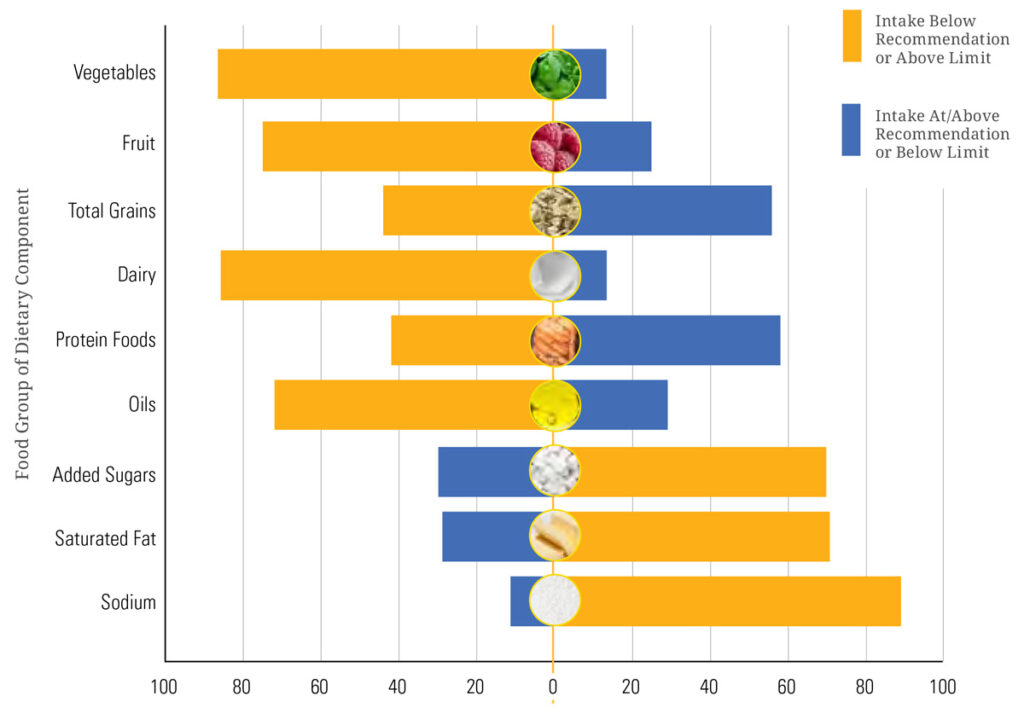The last several posts have provided a brief introduction to vitamins, minerals, and phytonutrients. All of these substances show up in nutrient-dense forms of foods we eat or, in the case of Vitamin D, get coaxed into production by sunshine. We falter in getting our recommended daily doses when we make poor dietary choices. According to the USDA’s 2015-2020 Dietary Guidelines for Americans, here are the percentage of the U.S. population ages 1 year and older who are below, at, or above each of their dietary recommendations:
According to this same report, poor dietary choices account for the country’s high incidence of obesity as well as preventable cardiovascular disease, diabetes, cancer, and osteoporosis. All of these conditions combined account for billions of dollars in healthcare costs. So, there’s ample reason to pursue a lifestyle that promotes a healthy diet and exercise. For those who don’t want to make these choices and/or simply want to hedge their bets, the multi-billion dollar supplement industry stands ready to pick up the slack.
Does it make sense to take a multivitamin every day?
Science does not support an affirmative vote. Drs. Mcpherson, Pipigas, and Pase performed a meta-analysis of 21 randomized, controlled trials to determine whether multivitamin-multimineral (MVMM) supplementation decreased mortality from all causes. No such benefit could be observed.1 In fact, it might be argued that MVMM supplements might have a deleterious impact if used in lieu of healthy eating, regular exercise, and tobacco cessation, three proven strategies for reducing the risk of cardiovascular disease, hypertension, diabetes, cancer, and the like.
The U.S. government does not require vitamin, mineral, and herbal supplement manufacturers to adhere to “current good manufacturing processes” (cGMPs) that ensure the identity, strength, quality, and purity of drug products. A full 7 years after these practices went into effect, 65% of dietary supplement manufacturers inspected by the FDA remained noncompliant.2 Supplements do not have to be pre-approved before hitting the store shelves; supplement ads do not have to be vetted before they’re presented to the public. Moreover, as Dr. Michael Greger of nutritionfacts.org states, “Dietary supplements may be adulterated with dangerous compounds, be contaminated, fail to contain the purported active ingredient, or contain unknown doses of the ingredients stated on the label.”3
When we take MVMM supplements, we risk getting too much of a good thing. Some nutrients like Vitamin A, folate/folic acid, niacin, copper, iron, and zinc are toxic when taken to excess. Supplementation may also inhibit absorption of other essential elements. For example, high levels of calcium has been shown to decrease the bioavailability of iron and magnesium.
Even if dietary supplements were proven to be safe and effective, they can’t compete with mother nature’s delivery system. The vitamins and minerals present in whole foods come prepackaged with a complementary complex of compounds that increase their collective efficacy. As a case in point, most vitamins produce optimum results in the presence of certain naturally occurring “cofactors,” such as trace minerals, enzymes, and coenzymes, as well as other vitamins. Plant-based food also contain phytonutrients that serve as anti-oxidant and anti-inflammatory agents.
Of course, there are those among us whose health conditions and/or diets prevent them from getting all of the vitamin and minerals they need. For example, vegans and vegetarians may take vitamin B12 supplements given the lack of meat in their diets. Persons with limited exposure to the sun may take Vitamin D supplements. If you choose to take supplements, make sure your physician knows what you’re taking. Some supplements interact poorly with prescription medication!
Finally, if you want some measure of assurance that the supplements you purchase are safe, check the labels for seals of any of the following organizations:
- U.S. Pharmacopeia (USP)
- ConsumerLab.com
- NSF International
- Underwriter’s Laboratory (UL)
None of these organizations guarantees that the supplements in question have therapeutic value. They test and certify that the products contain the ingredients advertised on the label, and they do spot checks during the year. Companies pay a healthy chunk of change for these endorsements, which is why so few of the tens of thousands of products on the market have them.
References:
